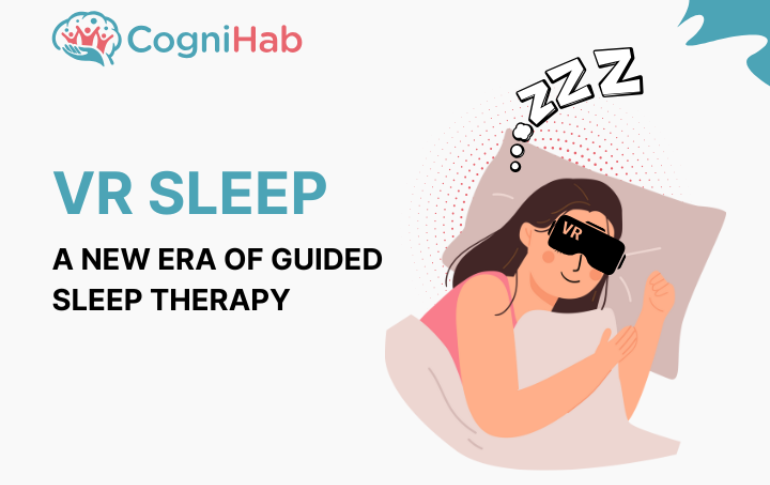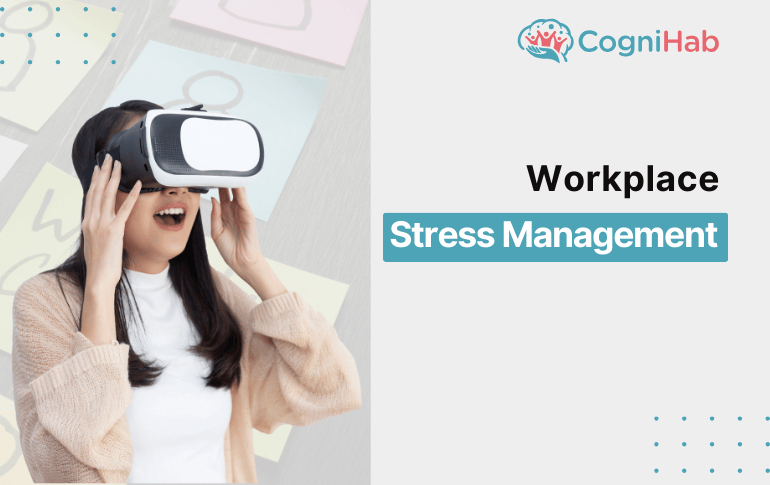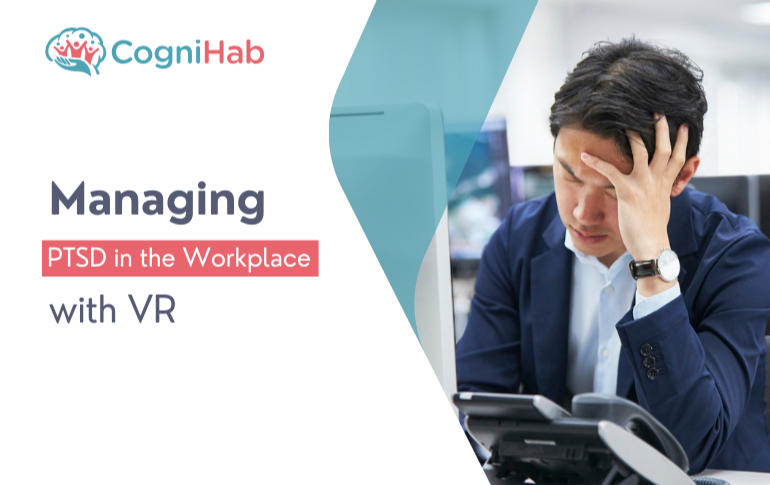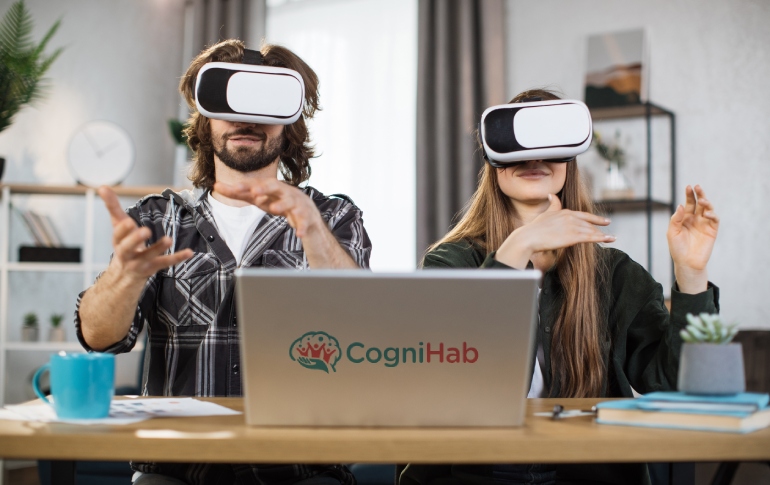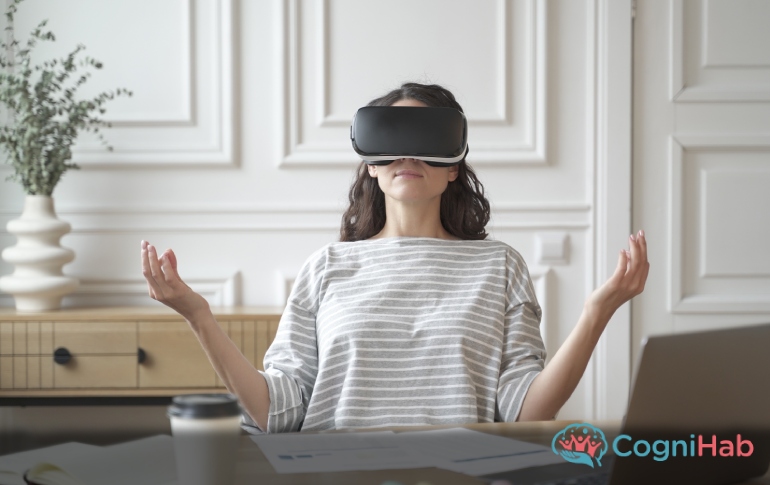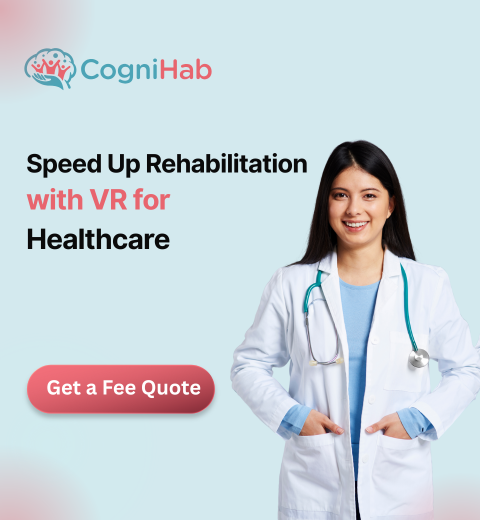VR for Sleep : A New Era of Guided Sleep Therapy
Sleep is not a luxury—it’s a basic need, yet millions around the world struggle to get enough of it. Stress, anxiety, poor habits, and constant screen exposure have made restless nights and tired mornings the norm. But now, a breakthrough solution is offering hope: sleeping in VR. With guided virtual reality sleep therapy, technology is transforming how we rest and recover.
Let’s explore how this works, who it’s for, and why leading organizations are turning to virtual reality meditation for their employees to reclaim quality sleep and create a stress-free work environment.
What is Sleeping in VR?
Sleeping in VR refers to using virtual reality headsets to create a calming, immersive environment that supports relaxation, mindfulness, and ultimately, sleep. It’s not about falling asleep in a headset all night (though some do), but rather about using VR sleep tools to ease into rest, clear the mind, and prepare the body for deep sleep. Think of it like stepping into a digital world designed for guided sleep meditation, relaxation, and emotional calm.
Also read, VRET: Reinventing Exposure Therapy Through Virtual Reality
Why People Use VR for Sleep?
Here are the top reasons people are turning to VR sleep therapy:
- To fall asleep faster
- To reduce racing thoughts
- To ease anxiety and stress
- To practice mindfulness before bed
- To avoid overthinking and doom scrolling
Just 10–20 minutes inside a VR sleep meditation session can have the same calming effect as traditional relaxation techniques—but with more focus, fewer distractions, and better engagement.
How Virtual Reality Sleep Therapy Works
Virtual Reality Sleep Therapy combines sound, visuals, and guided voice instructions inside a 360-degree digital space.
These VR sleep environments include:
- Calming nature scenes (beaches, forests, space)
- Binaural beats or white noise
- Gentle narration with best guided sleep meditation techniques
- Breathing exercises
- Sleep-inducing body scans
The goal? To quiet the nervous system and guide users into deep rest.
Key Features of VR Sleep Therapy
- Immersive visual design
- Soothing audio and voice
- Customizable durations (5 mins to 60 mins)
- Options for anxiety, insomnia, or mindfulness
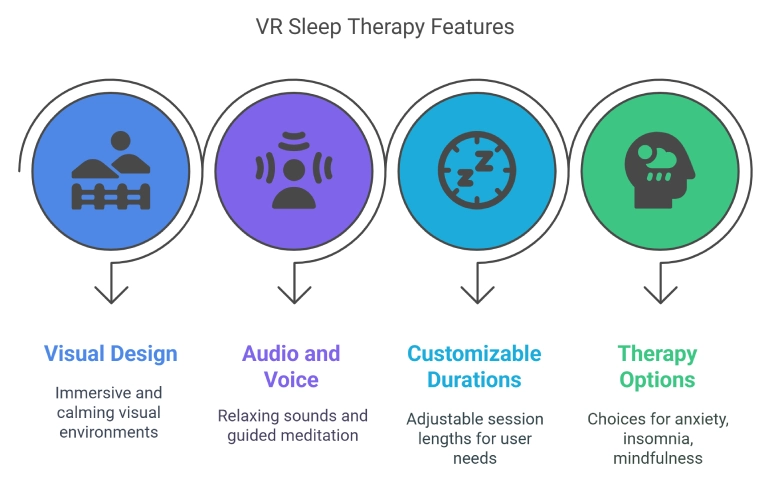
These features work together to deliver effective virtual reality sleep therapy for individuals of all ages.
Recommended Read, virtual reality therapy for anxiety disorders
VR Sleep Therapy for Employees
Sleep issues are a silent productivity killer. Studies show that sleep-deprived employees are 30% less productive, more irritable, and more prone to burnout.
That’s why forward-thinking companies are now offering VR sleep therapy for employees as part of their wellness programs.
How it helps at work:
- Mid-day mental resets
- Power naps with guided meditation
- Nighttime relaxation routines
- Anxiety relief before presentations or meetings
Imagine your team members stepping into a VR forest at lunch, practicing meditation for sleep and anxiety, and returning to work refreshed. That’s the power of VR.
Is Sleeping in VR Safe?
Yes, but with some caveats.
VR sleep therapy is not meant to replace medical treatment for severe sleep disorders. However, for mild anxiety, racing thoughts, or trouble falling asleep, it is non-invasive, drug-free, and side-effect-free.
Users should:
- Remove the headset once they feel sleepy
- Sit or lie in a comfortable position
- Avoid wearing it all night unless the device supports it safely
- Use VR in a dark, quiet room to avoid interruptions
If used mindfully, sleeping in VR can be a powerful part of a healthy bedtime routine.
Top Use Cases for VR Sleep Meditation
Here’s how people are using VR sleep in their everyday life:
| Use Case | Description |
| Night Routine | Use a 10-minute guided sleep meditation to wind down. |
| Anxiety Relief | Try a VR breathing session after a stressful day. |
| Midday Nap | Use VR sleep therapy for employees to power nap |
| Jet Lag Recovery | Reset your body clock with VR sleep environments |
| Chronic Insomnia Support | Complement CBT or therapy with calming VR sessions. |
What Makes VR Sleep Different from Apps?
Unlike phone apps or YouTube videos, VR sleep therapy eliminates distractions, you’re not tempted to scroll, not interrupted by notifications, but fully immersed. Most importantly, it creates a sense of presence, making you feel as if you’ve left your stressful environment and entered a peaceful one. This mental shift helps the brain exit its “fight or flight” cycle and transition into the “rest and digest” mode, which is the ideal state for deep, restorative sleep.
Best Guided Sleep Meditation in VR
When searching for the best guided sleep meditation, choose platforms that offer:
- Anxiety keeps the brain active at night
- VR shuts out distractions and external stressors
- Meditation techniques guide users into present awareness
- Visual cues help the brain reframe anxious thoughts
- Sleep music helps align brainwaves with rest
- This makes meditation for sleep and anxiety more effective, more engaging, and easier to stick to.
Some VR wellness platforms even allow users to create their own playlists or choose different sleep goals
Meditation for Sleep and Anxiety
Here are some reasons why use sleep therapy in VR in managing anxiety.
- Anxiety keeps the brain active at nigh
- VR shuts out distractions and external stressors
- Meditation techniques guide users into present awareness
- Visual cues help the brain reframe anxious thoughts
- Sleep music helps align brainwaves with rest
This makes meditation for sleep and anxiety more effective, more engaging, and easier to stick to.
Choosing the Right VR Sleep Platform
Here are a few questions to consider before choosing your VR sleep solution:
- Is the platform built by wellness professionals or therapists?
- Does it have positive reviews from real users?
- Is it compatible with your VR headset?
- Can it be used without Wi-Fi after download?
- Does it offer customizable sessions based on mood or condition?
If you're a business, check if the best provider like cognihab which offers VR sleep therapy for employees, including analytics, usage data, and enterprise licenses.
Is Sleeping in VR the Future?
The demand for non-medication sleep solutions is rising, with people seeking quick, easy, and effective tools they can trust. VR sleep therapy offers a way to relax deeply, quiet the mind, and improve sleep without side effects or ongoing costs. As more companies embrace VR wellness programs, this technology is poised to become as commonplace in the workplace as ergonomic chairs or meditation rooms.
Final Thoughts
Sleep affects everything—focus, mood, health, and performance. If you or your team struggle with falling asleep, staying asleep, or quieting the mind, virtual reality sleep therapy might be the upgrade you’ve been waiting for, Contact Cognihab to explore how VR sleep solutions can transform your nights and boost overall well-being.


